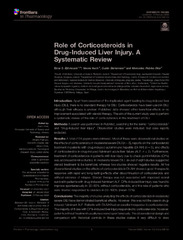Приказ основних података о документу
Role of Corticosteroids in Drug-Induced Liver Injury. A Systematic Review
| dc.creator | Björnsson, Einar S. | |
| dc.creator | Vučić, Vesna M. | |
| dc.creator | Stirnimann, Guido | |
| dc.creator | Robles-Díaz, Mercedes | |
| dc.date.accessioned | 2022-03-04T10:40:58Z | |
| dc.date.available | 2022-03-04T10:40:58Z | |
| dc.date.issued | 2022 | |
| dc.identifier.issn | 1663-9812 | |
| dc.identifier.uri | http://rimi.imi.bg.ac.rs/handle/123456789/1216 | |
| dc.description.abstract | Introduction: Apart from cessation of the implicated agent leading to drug-induced liver injury (DILI), there is no standard therapy for DILI. Corticosteroids have been used in DILI, although their efficacy is unclear. Published data showed either beneficial effects or no improvement associated with steroid therapy. The aim of the current study was to perform a systematic review of the role of corticosteroids in the treatment of DILI. Methods: A search was performed in PubMed, searching for the terms: “corticosteroids” and “drug-induced liver injury”. Observation studies were included, but case reports excluded. Results: A total of 24 papers were retrieved. Most of these were observational studies on the effects of corticosteroids in moderate/severe DILI (n = 8), reports on the corticosteroid treatment in patients with drug-induced autoimmune hepatitis (DI-AIH) (n = 5), and effects of corticosteroids in drug-induced fulminant acute liver failure (ALF, n = 2). Furthermore, treatment of corticosteroids in patients with liver injury due to check point inhibitors (CPIs) was addressed in nine studies. In moderate/severe DILI, six out of eight studies suggested steroid treatment to be beneficial, whereas two studies showed negative results. All five observational studies on the effects of corticosteroids in DI-AIH showed good therapeutic response with rapid and long lasting effects after discontinuation of corticosteroids and without evidence of relapse. Steroid therapy was not associated with improved overall survival in patients with drug-induced fulminant ALF. CPIs-induced liver injury was found to improve spontaneously in 33–50% without corticosteroids, and the rate of patients who were treated responded to steroids in 33–100% (mean 72%). Conclusions: The majority of studies analyzing the effects of corticosteroids in moderate/severe DILI have demonstrated beneficial effects. However, this was not the case in drug-induced fulminant ALF. Patients with DI-AIH had an excellent response to corticosteroids. The majority of those with CPIs-induced liver injury responded to corticosteroids; however, patients without treatment usually recovered spontaneously. The observational design and comparison with historical controls in these studies makes it very difficult to draw conclusions on the efficacy of corticosteroids in DILI. Therefore, there is a strong need for a randomized controlled trial to properly assess the role of corticosteroids in DILI. | |
| dc.publisher | Frontiers Media S.A. | |
| dc.relation | COST Action “Prospective European Drug-Induced Liver Injury Network” (PRO-EURO-DILI-NET) - CA17112 | |
| dc.rights | openAccess | |
| dc.rights.uri | https://creativecommons.org/licenses/by/4.0/ | |
| dc.source | Frontiers in Pharmacology | |
| dc.subject | DILI | |
| dc.subject | corticosteroids | |
| dc.subject | treatment of DILI | |
| dc.subject | acute liver failure | |
| dc.subject | drug-induced autoimune hepatitis | |
| dc.subject | drug-induced liver injury | |
| dc.subject | check point inhibitors | |
| dc.title | Role of Corticosteroids in Drug-Induced Liver Injury. A Systematic Review | |
| dc.type | article | |
| dc.rights.license | BY | |
| dc.citation.rank | M21~ | |
| dc.citation.spage | 820724 | |
| dc.citation.volume | 13 | |
| dc.identifier.doi | 10.3389/fphar.2022.820724 | |
| dc.identifier.fulltext | http://rimi.imi.bg.ac.rs/bitstream/id/2680/Role_of_Corticosteroids_in_Drug-Induced_Liver_Injury_pub_2022.pdf | |
| dc.type.version | publishedVersion |

